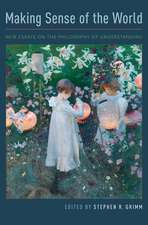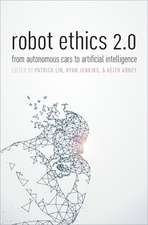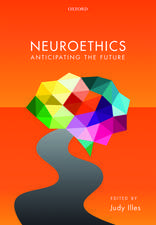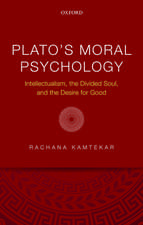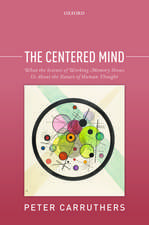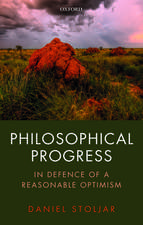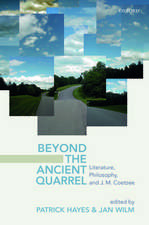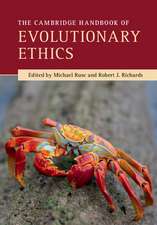Death and the Afterlife: The Berkeley Tanner Lectures
Autor Samuel Scheffler Editat de Niko Kolodnyen Limba Engleză Paperback – 29 sep 2016
| Toate formatele și edițiile | Preț | Express |
|---|---|---|
| Paperback (1) | 163.71 lei 31-37 zile | |
| Oxford University Press – 29 sep 2016 | 163.71 lei 31-37 zile | |
| Hardback (1) | 287.11 lei 31-37 zile | |
| Oxford University Press – 14 noi 2013 | 287.11 lei 31-37 zile |
Preț: 163.71 lei
Preț vechi: 197.33 lei
-17% Nou
Puncte Express: 246
Preț estimativ în valută:
31.33€ • 32.79$ • 26.07£
31.33€ • 32.79$ • 26.07£
Carte tipărită la comandă
Livrare economică 19-25 martie
Preluare comenzi: 021 569.72.76
Specificații
ISBN-13: 9780190469177
ISBN-10: 019046917X
Pagini: 224
Dimensiuni: 201 x 132 x 20 mm
Greutate: 0.23 kg
Editura: Oxford University Press
Colecția OUP USA
Seria The Berkeley Tanner Lectures
Locul publicării:New York, United States
ISBN-10: 019046917X
Pagini: 224
Dimensiuni: 201 x 132 x 20 mm
Greutate: 0.23 kg
Editura: Oxford University Press
Colecția OUP USA
Seria The Berkeley Tanner Lectures
Locul publicării:New York, United States
Recenzii
...combined with Scheffler's eminently readable (and often humourous!) prose style, and the insightful and provocative exchanges that he has with his similarly-distinguished interlocutors, propels Death and the Afterlife into that rare class of philosophical books that are both valuable and enjoyable."
Clearly, this book brings together some impressive intellectual firepower."
With its careful arguments, counterarguments, and comparative evaluation of alternative hypotheses, this book is a superb example of the application of analytic philosophy to a subject that is of fundamental concern to everyone, not only to academic philosophers. Scheffler has opened up a new range of questions about life and death."
Thinking about the end of humanity provides insights into what we value, and why we value it...an insightful look at what death means to us."
[Scheffler's] wonderful Tanner Lectures, recently published as Death and the Afterlife, attempt to extract several striking lessons from our supposed reaction to the doomsday scenario....One of the many gems embedded in Scheffler's lectures is a nicely observed contrast between our sense of catastrophic horror in the face of the doomsday and infertility scenarios, and our relative calm in the face of the fact that everyone now living will one day be dead."
Scheffler has produced a superb essay
[Scheffler's] discussion of the issues with which he has concerned himself is fresh and original. Moreover, so far as I am aware, those issues are themselves pretty much original with him. He seems really to have raised, within a rigorously philosophical context, some new questions. At least, so far as I know, no one before has attempted to deal with those questions so systematically. So it appears that he has effectively opened up a new and promising field of philosophical inquiry. Not bad going, in a discipline to which many of the very best minds have already devoted themselves for close to three thousand years.
This is some of the most interesting and best-written philosophy I have read in a long time. Scheffler's book is utterly original in its fundamental conception, brilliant in its analysis and argument, and concise and at times beautiful in its formulation.
A truly wonderful and very important book.
Scheffler's book is a beautiful example of philosophical reflection on matters of great significance... He writes in a rigorous but engaging manner about things of obvious importance to us all. Death and the Afterlife is a model of how to make difficult philosophy intelligible to thinking people.
Death and the Afterlife constitutes two remarkable achievements. The first is rare enough. Samuel Scheffler presents us with a set of reflections, the importance, and arguably the correctness, of which seem obvious in retrospect, but which most people will not have previously registered, let alone thought to be of considerable profundity. The second is even rarer. Scheffler appears to be the first person, in nearly 3,000 years of western philosophy, to get to grips, in a sustained and insightful way, with the particular questions his book raises.
Scheffler's thesis has striking implications for the way we should think about the demands of our egos. Our self-interest doesn't merely extend, as we're used to thinking, to the preservation of ourselves and those we love. It extends to the lives of indeterminate future people we neither know nor love.
A brilliant example of how a thought experiment can make us rethink our values.
Clearly, this book brings together some impressive intellectual firepower."
With its careful arguments, counterarguments, and comparative evaluation of alternative hypotheses, this book is a superb example of the application of analytic philosophy to a subject that is of fundamental concern to everyone, not only to academic philosophers. Scheffler has opened up a new range of questions about life and death."
Thinking about the end of humanity provides insights into what we value, and why we value it...an insightful look at what death means to us."
[Scheffler's] wonderful Tanner Lectures, recently published as Death and the Afterlife, attempt to extract several striking lessons from our supposed reaction to the doomsday scenario....One of the many gems embedded in Scheffler's lectures is a nicely observed contrast between our sense of catastrophic horror in the face of the doomsday and infertility scenarios, and our relative calm in the face of the fact that everyone now living will one day be dead."
Scheffler has produced a superb essay
[Scheffler's] discussion of the issues with which he has concerned himself is fresh and original. Moreover, so far as I am aware, those issues are themselves pretty much original with him. He seems really to have raised, within a rigorously philosophical context, some new questions. At least, so far as I know, no one before has attempted to deal with those questions so systematically. So it appears that he has effectively opened up a new and promising field of philosophical inquiry. Not bad going, in a discipline to which many of the very best minds have already devoted themselves for close to three thousand years.
This is some of the most interesting and best-written philosophy I have read in a long time. Scheffler's book is utterly original in its fundamental conception, brilliant in its analysis and argument, and concise and at times beautiful in its formulation.
A truly wonderful and very important book.
Scheffler's book is a beautiful example of philosophical reflection on matters of great significance... He writes in a rigorous but engaging manner about things of obvious importance to us all. Death and the Afterlife is a model of how to make difficult philosophy intelligible to thinking people.
Death and the Afterlife constitutes two remarkable achievements. The first is rare enough. Samuel Scheffler presents us with a set of reflections, the importance, and arguably the correctness, of which seem obvious in retrospect, but which most people will not have previously registered, let alone thought to be of considerable profundity. The second is even rarer. Scheffler appears to be the first person, in nearly 3,000 years of western philosophy, to get to grips, in a sustained and insightful way, with the particular questions his book raises.
Scheffler's thesis has striking implications for the way we should think about the demands of our egos. Our self-interest doesn't merely extend, as we're used to thinking, to the preservation of ourselves and those we love. It extends to the lives of indeterminate future people we neither know nor love.
A brilliant example of how a thought experiment can make us rethink our values.
Notă biografică
Samuel Scheffler is University Professor in the Department of Philosophy at New York University. He is the author of Human Morality, Boundaries and Allegiances, and Equality and Tradition. He is a Fellow of the American Academy of Arts and Sciences. In 2012, he delivered the prestigious Tanner Lectures on Human Values at Berkeley, on which this book is based.














